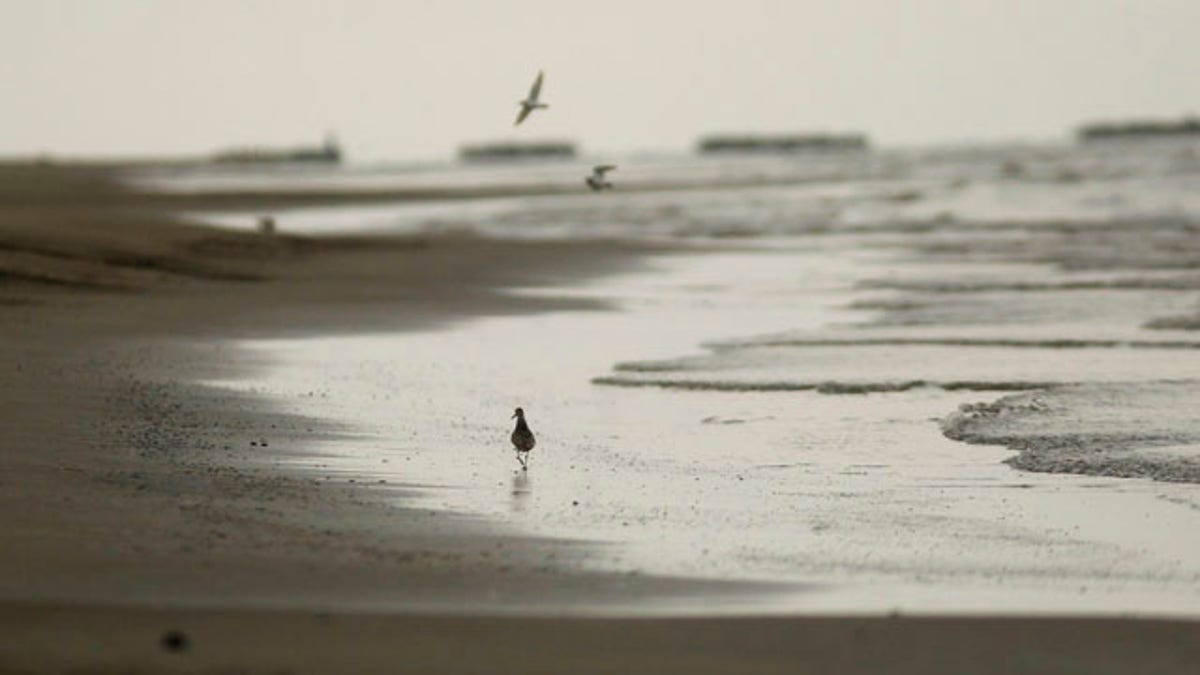
Aug. 9: Birds are seen on the empty shoreline after a rain storm in Grand Isle, La. (AP)
MIAMI – NEW ORLEANS -- Bad weather has delayed into early next week a massive effort to permanently kill BP's blown-out well in the Gulf of Mexico -- a costly operation the government now says it is not certain how best to carry out.
Still, retired Coast Guard Adm. Thad Allen said the final "kill" of the well should be done early next week, if it's done at all.
Allen, the government's point man for the spill, said Wednesday that he hopes to turn over his high-profile job to someone else by late September or early October, another sign that the officials are beginning to scale back their response to one of the worst offshore oil spills in history. He said he can leave when there is no chance that more oil will leak into the Gulf.
A temporary cap has kept oil from spewing for a month, and crews are finishing a relief well in preparation for the "bottom kill," which involves pumping mud and cement from a well deep underground for a permanent seal.
The federal government and BP have recently raised the possibility that they won't need to perform the operation at all, since the well was plugged last month with mud and cement pumped in through the top.
Allen has insisted for days that BP must go ahead with the bottom kill, even though the top plug appeared to be holding. On Tuesday and again on Wednesday, though, he said testing still needs to be done on the well before a final decision is made.
BP and the federal government will check to see whether the cement pumped in through the top went down into the reservoir, came back up and plugged the space between the inner piping and the outer casing. If so, the bottom kill might not be necessary.
Meanwhile, the tropical depression that had threatened to turn into a tropical storm in the Gulf dissipated Wednesday, a day after crews drilling the final few feet of the relief well halted their work because of concerns about the weather.
Allen said Wednesday that suspending work at the wellhead while the storm passes will cost crews about 96 hours, meaning work on the bottom kill won't be done until at least Monday or Tuesday. Heavy rain is still forecast for the Gulf into Thursday and he did not say when the relief well drilling might resume.
Though the storm meant another delay in the work, which was stopped once before because of Tropical Storm Bonnie, it could also help break down any oil remaining in the water, according to Jerry Galt, an oceanographer with the National Oceanic Atmospheric Association.
"Any kind of energetic storm will typically just disperse it more at this point," Galt said.
Government scientists estimate that almost three-quarters of the oil that spewed after the April 20 explosion of the offshore drilling rig Deepwater Horizon has already been collected by the temporary containment cap, cleaned up or chemically dispersed, or naturally deteriorated.
Also Wednesday, U.S. Rep. Edward Markey, a Massachusetts Democrat, called on BP PLC to accept the government's estimate that 4.9 million barrels, or 206 million gallons (780 million liters), had spilled. The amount is important because it could help determine what fines BP faces for the spill.
Markey sent a letter to the head of BP's U.S. operations telling him that the oil giant should legally own up to its obligations as one of the responsible parties.
Civil penalties can be levied under a variety of environmental protection laws, including fines of up to $1,100 for each barrel of oil spilled. If BP were found to have committed gross negligence or willful misconduct, the civil fine could be up to $4,300 per barrel.
That means BP could face fines of up to $21 billion.

